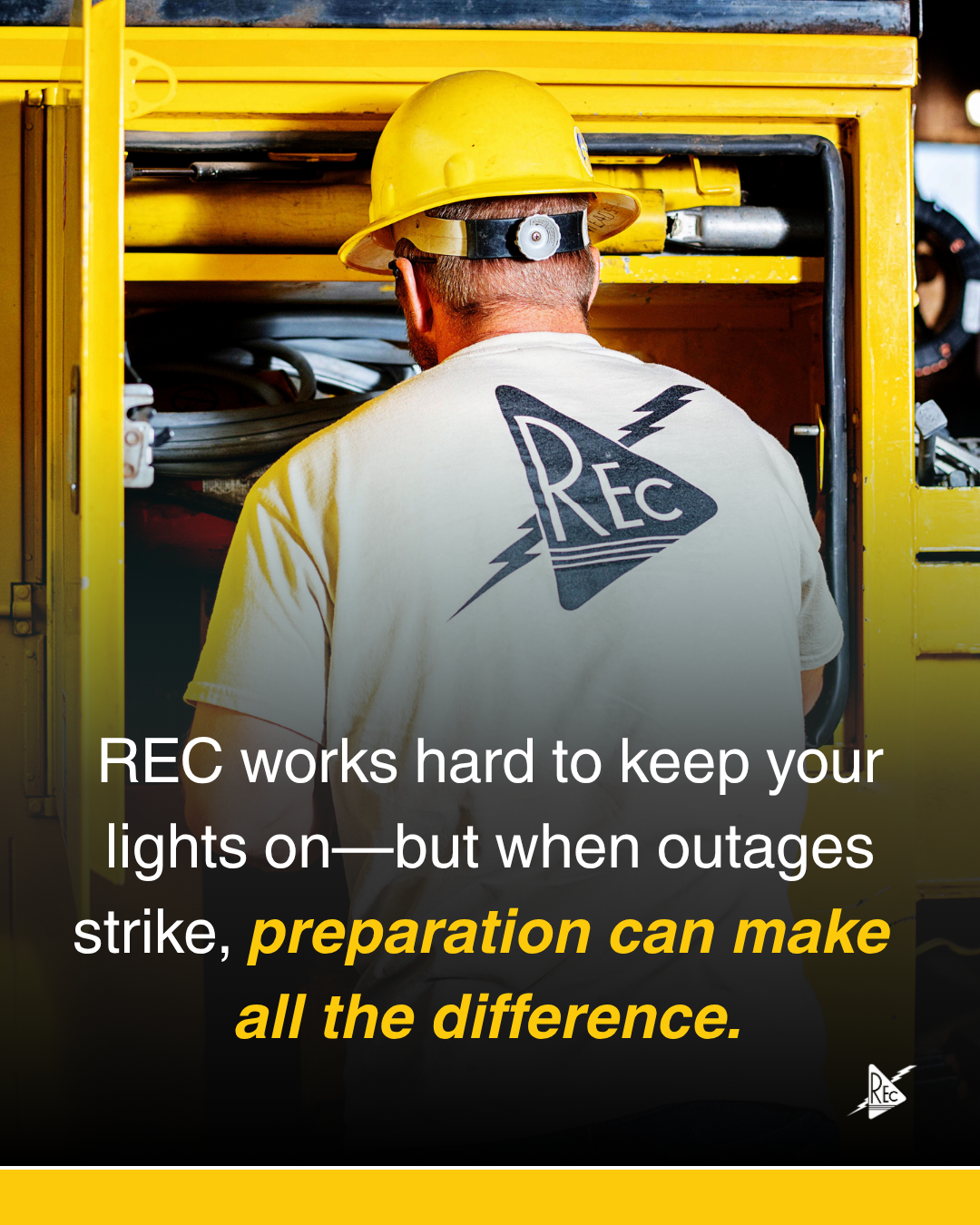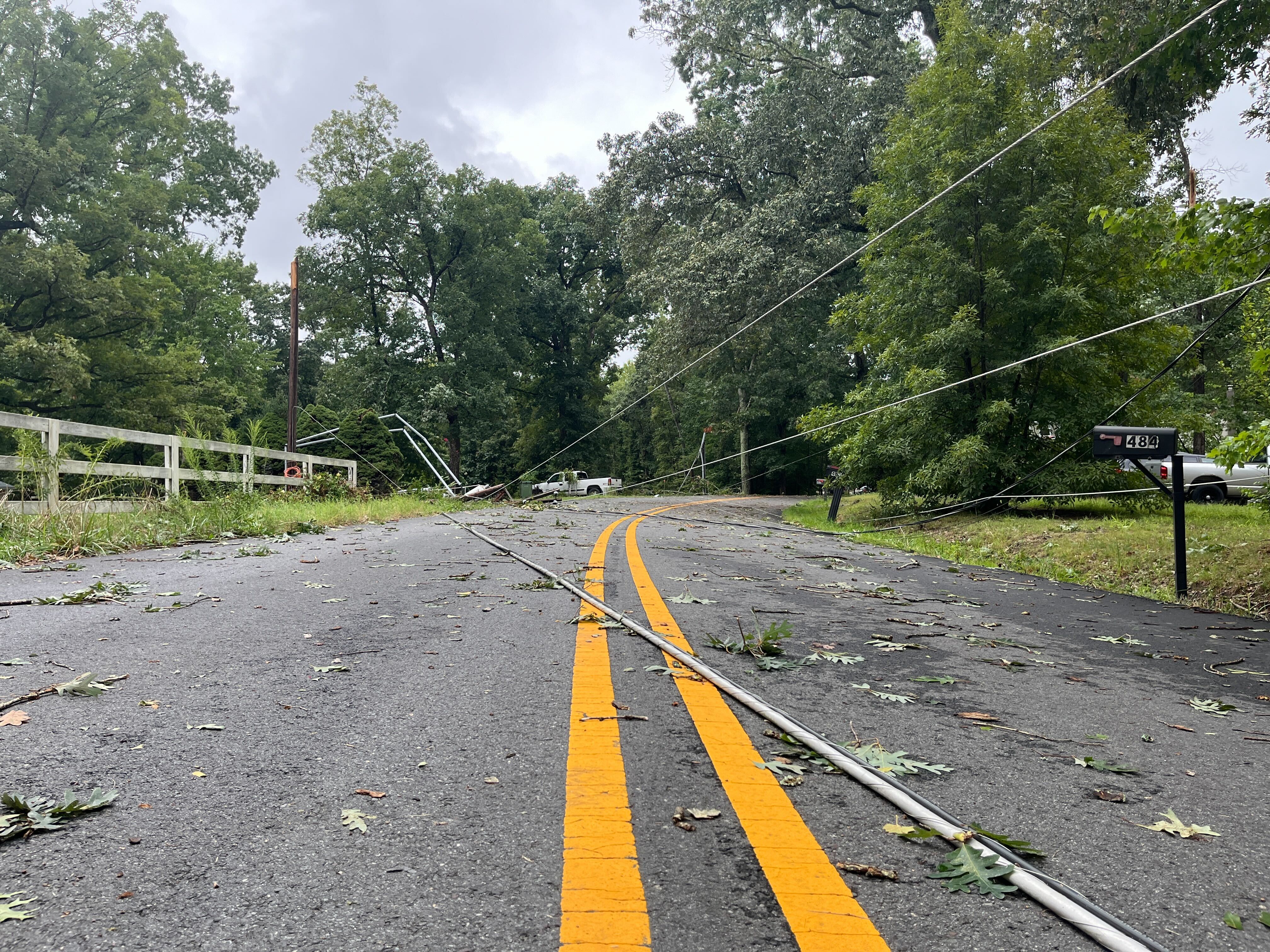Outage Preparedness:
Prepare and Stay Safe
At Rappahannock Electric Cooperative, we're committed to providing reliable electricity, but severe weather, unforeseen events, or even equipment issues can sometimes lead to outages. That's why being prepared before, during and after an outage is crucial for the safety and well-being of your household or business.

Before the Outage: Be Ready
The best time to prepare for a power outage is before one happens. Taking some proactive steps now can significantly reduce stress and ensure your household is ready for anything. Think of it like a safety net: the more you prepare, the more secure you'll feel when an unexpected outage occurs.
1. Build an Emergency Kit
While each of us has items specific to our personal needs — such as multi-day supplies of medications, baby food, or items for pets — this a solid starting point for preparing you and your family for a major storm.
Download Your Storm Prep Checklist Here
Your Kit Should Include:
![]() Portable Power Bank/s (High-Capacity)
Portable Power Bank/s (High-Capacity)
![]() NOAA Weather Radio (Hand-Crank or Battery-Powered)
NOAA Weather Radio (Hand-Crank or Battery-Powered)
![]() Water (1 gallon per person per day – at least 3 days)
Water (1 gallon per person per day – at least 3 days)
![]() Ready-to-eat meals, energy bars, or even freeze-dried options.
Ready-to-eat meals, energy bars, or even freeze-dried options.
![]() Flashlights (LED) + Extra Batteries
Flashlights (LED) + Extra Batteries
![]() Smartphone with Emergency Apps Pre-Installed
Smartphone with Emergency Apps Pre-Installed
![]() Multi-Tool or Swiss Army Knife
Multi-Tool or Swiss Army Knife
![]() First Aid Kit (Well-Stocked)
First Aid Kit (Well-Stocked)
![]() Important Documents (Waterproof Folder or USB Drive)
Important Documents (Waterproof Folder or USB Drive)
![]() Back-Up Communication Device
Back-Up Communication Device
![]() Emergency Blankets or Sleeping Bags
Emergency Blankets or Sleeping Bags
![]() Medications & Personal Hygiene Supplies
Medications & Personal Hygiene Supplies
![]() Cash (Small Bills)
Cash (Small Bills)
![]() Protective Gear
Protective Gear

2. Prepare Your Home
![]() Fill bathtubs with water for hygiene needs (if on a well).
Fill bathtubs with water for hygiene needs (if on a well).
![]() Unplug sensitive electronics.
Unplug sensitive electronics.
![]() Know how to manually open your garage.
Know how to manually open your garage.
![]() Check backup generators and fuel supply (never run indoors).
Check backup generators and fuel supply (never run indoors).
3. Stay Connected
![]() Download the REC SmartHub app and enable outage alerts.
Download the REC SmartHub app and enable outage alerts.
![]() Follow REC on social media for real-time updates.
Follow REC on social media for real-time updates.
![]() Write down key emergency contacts.
Write down key emergency contacts.
Even the best preparations can't prevent every outage, but knowing what to do when the lights go dark can make a significant difference in your safety and comfort.
1. Report the Outage
![]() Use the REC SmartHub App or call 1-800-552-3904 to report the outage.
Use the REC SmartHub App or call 1-800-552-3904 to report the outage.
2. Stay Informed & Safe
![]() Listen to weather updates via battery-powered radio.
Listen to weather updates via battery-powered radio.
![]() Avoid using candles (fire risk) -- use flashlights instead.
Avoid using candles (fire risk) -- use flashlights instead.
![]() Stay warm. If you don't have an alternate, non-electric heat source, know the locations of the closest warming centers.
Stay warm. If you don't have an alternate, non-electric heat source, know the locations of the closest warming centers.
3. Stay Indoors and Limit Travel
![]() Downed lines can be deadly. Assume all downed power lines are live.
Downed lines can be deadly. Assume all downed power lines are live.
![]() Keep pets and children away from unsafe areas.
Keep pets and children away from unsafe areas.
After the Outage: Move Forward Safely
While the immediate crisis may be over, the period after an outage is crucial for ensuring your safety, assessing any damage and getting back to normal.
1. Wait for the All-Clear
![]() REC crews will be working to restore power as quickly and safely as possible.
REC crews will be working to restore power as quickly and safely as possible.
![]() Stay back from repair areas and equipment.
Stay back from repair areas and equipment.
2. Reset and Check Appliances
![]() Gradually plug electronics back in to avoid overloads.
Gradually plug electronics back in to avoid overloads.
![]() Check your food and toss anything that may have spoiled.
Check your food and toss anything that may have spoiled.
3. Inspect for Damage
![]() Look for water damage, broken pipes, or downed trees.
Look for water damage, broken pipes, or downed trees.
![]() Stay clear of downed lines -- report them immediately to REC.
Stay clear of downed lines -- report them immediately to REC.




